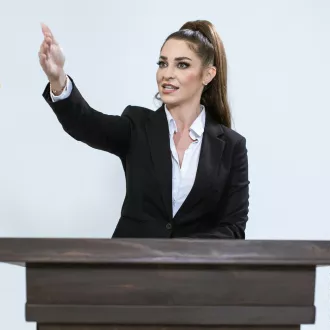Transcription The construction of identity
Identity building is a complex and multifaceted process that takes place in various spheres of life, including the political arena. In political discourse, leaders play a fundamental role in using diverse methods to reinforce a sense of collective identity in a community or nation.
Through speeches, events and symbols, political leaders seek to generate a sense of belonging, highlight shared values and strengthen social ties among citizens. In this section, we will explore in depth how political oratory contributes to the construction of collective identity.
Shared vision: Speeches play a crucial role in building the collective identity of a community or nation. Through the powerful tool of oratory, political leaders have the ability to articulate a shared vision that unites and mobilizes community members around common goals.
By effectively communicating the values, traditions and aspirations that define the community, citizens' sense of identity is strengthened.
Strengthening the sense of unity: Political leaders use a variety of methods in their speeches to strengthen the sense of unity among citizens. Below are some specific examples of how this objective is achieved:
- Appeal to common values: they emphasize the values they share with the community, such as justice, equality or freedom. Through speeches that evoke these values, they seek to awaken citizens' pride in and commitment to their community. For example: "We value equal opportunities for all. Together, let's build a future of success and prosperity for every person in our community."
- Shared narratives: Political leaders use narratives that help create a sense of continuity, generating a stronger collective identity. For example: "Let's remember how we overcame past challenges together. Our community has always demonstrated resilience and solidarity in difficult times. Let us continue to build on that legacy for an even brighter future."
- Encourage civic participation: Encourage the active participation of citizens in decision-making and political life. They promote the importance of voting, participating in community activities and expressing opinions to enhance democracy. For example: "By exercising our right to vote, we are contributing to building our community and making decisions that affect us all".
- Inclusive language: They use inclusive language that recognizes and values the diversity of the community. They promote respect and equality for all citizens, regardless of ethnicity, gender, sexual orientation or religion. For example: "We value diversity and the unique contribution that each individual brings. We recognize that each person, regardless of his or her background, plays a vital role in the development of our community."
Symbols and emblems: Symbols and emblems play a significant role in building collective identity in political oratory
construction identity




